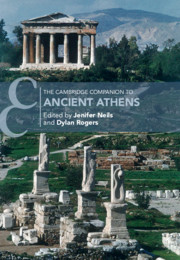Book contents
- The Cambridge Companion to Ancient Athens
- Cambridge Companions to the Ancient World
- The Cambridge Companion to Ancient Athens
- Copyright page
- Contents
- Contributors
- Abbreviations
- Athens: An Introduction
- 1 #Leagros: An Athenian Life
- Part I The Urban Fabric
- Part II Inhabitants
- 11 Population and Social Structure
- 12 The Athenian Family
- 13 Death and Disease
- 14 Animals in Athenian Life
- Part III Business/Commerce
- Part IV Culture and Sport
- Part V Politics
- Reception
- Index
- References
11 - Population and Social Structure
from Part II - Inhabitants
Published online by Cambridge University Press: 10 March 2021
- The Cambridge Companion to Ancient Athens
- Cambridge Companions to the Ancient World
- The Cambridge Companion to Ancient Athens
- Copyright page
- Contents
- Contributors
- Abbreviations
- Athens: An Introduction
- 1 #Leagros: An Athenian Life
- Part I The Urban Fabric
- Part II Inhabitants
- 11 Population and Social Structure
- 12 The Athenian Family
- 13 Death and Disease
- 14 Animals in Athenian Life
- Part III Business/Commerce
- Part IV Culture and Sport
- Part V Politics
- Reception
- Index
- References
Summary
This chapter provides an overview of the debate surrounding the population of Athens in the Classical period, and the methodologies used to estimate it. It further summarizes some of the key social, economic, political, and religious groups and divisions in Classical Athenian society and how these interacted with each other and with questions of belonging and identity in the polis.
- Type
- Chapter
- Information
- The Cambridge Companion to Ancient Athens , pp. 159 - 172Publisher: Cambridge University PressPrint publication year: 2021
References
Further Reading
The available literature on the population and social structure of Athens is vast and continues to multiply; for that reason, what follows is necessarily selective. For questions of population, a good place to begin is Akrigg 2019, as he references much of the earlier literature on both sides of the population debate. Much of the work on Athenian society has been focused on various groups and statuses. For the phratries, the standard work is still Lambert 1993, but see also Humphreys 2018. For a general examination of status categories in Athens, see Kamen 2013. On questions of gender and citizenship, see Blok 2017. For wealth and poverty, see Taylor 2017, and Kierstead and Klapaukh 2018. On associations in Athens and their connections with citizenship, see Jones 1999, Ismard 2010 and 2018, and Humphreys 2018. On questions of kinship relations, see Humphreys 2018. On metics, the standard work is still Whitehead 1977; for metic women, Kennedy 2014. For slavery, see Vlassopoulos 2009, Lewis and Canevaro 2014, and Lewis 2018.



